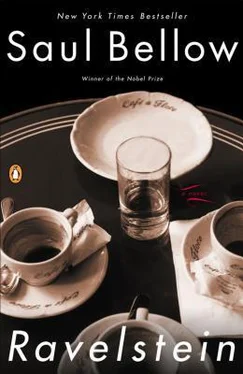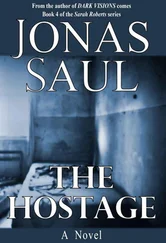I asked him what that meant.
Seated and circumspect, his hands on his knees, his pale look gone with the leaky heart that had been killing him, the white hair curled around his now ruddy face, he said about himself that just then he felt like the Santa Claus in the department store asking kid dies what they wanted for Christmas. Because at the center of his "physical plant" (his own term for it) his borrowed heart had taken over, and he felt that a different temperament had come with it-boyish, heedless, not just willing but glad to take a risk. "I feel a little like that fellow who calls himself Evel Knievel and jumps his Honda bike over sixteen beer barrels."
I understood this, oddly enough, because at the time I was being treated by a physical therapist who told me that the main organs of the body were surrounded by charged energies and that she, the therapist, was then and there in touch with my gall bladder. I said, "But I no longer have a gall bladder. It's been taken out."
"Sure, but those energies remain-and they'll be there as long as you live," she told me.
I bring this up, with a touch of agnosticism, because I was asked to believe that it was not the young man's heart alone that had changed bodies. The organs are also repositories of the shadows or the assertive impulses-anxious or happy as the case may be, and these had come into Herbst's body with the new heart. They now would need to come to terms with the forces of their new setting.
If this were a kidney or a pancreatic transplant it would be different. But the heart carries so many connotations; it's the center of man's emotions-his higher life.
At any rate, Morris, a German Jew, was saved by this Missouri boy. And I had to restrain myself from questioning him about a heart originally Christian or Gentile, with its shadow energies and its rhythms-how did it adapt itself to Jewish needs or peculiarities, pains and ideas? At this point I could not discuss the subject with Ravelstein. He was in no condition to turn his thoughts in that direction.
The most I dared to do was to ask Morris in the most tentative way about the transplant. He said that in all states when you were issued a driver's license you were asked to check a box agreeing or declining to be an organ donor. "In half a second the kid made an X-what the hell, why not! So the heart was flown east and the surgery was done at Mass General."
"And you don't know anything else about the kid?"
"Very little. I wrote a thank-you letter to his parents."
"What did you tell them, if you don't mind saying?"
"I told them, honestly, how grateful I was, and I came on as a straightforward American so they wouldn't have to worry that their boy's heart was keeping some foreign creep alive…
"It must give you second thoughts, on the road, when you're suddenly surrounded by a gang of young guys on bikes, with scarves, caps, and goggles."
"I'm always braced for that."
"Did the boy's family answer?"
"Not so much as a postcard. But they must be glad his heart is living on." He turned his face downward with a tentative look. His fingers spread on the temple propped up his head-as if he were looking for answers in the motif of Ravelstein's Persian carpet, or doping out a singular message there about the miraculous extension he was given. I had no hope invested in the carpet. I fell back on the language of big-city politics-a strange fix had been put in. And so life-that is, what one incessantly saw, the pictures produced by life-continued. This was related to something I had said to Ravelstein.
When he asked me what view I took of death, how I imagined it, I said that the pictures would stop. Evidently I saw as pictures what Americans refer to as Experience. I wasn't at the moment thinking of the pictures newly available, recently offered by technology-the kind of tour one now might take of one's digestive tract, or of the heart. The heart-only a group of muscles after all. But how tenacious they are, starting to beat in the womb, and going in rhythm for as long as a century. In Herbst's case it had petered out in his fifties, and the transplant would keep him going into his eighties.
He signed himself into the hospital once a year for tests. But by and large his life went on as before. He looked kindly, tolerant, open-minded. His benevolent, silent clock of a face with its clean, curly white border of beard was calm and healthy. He looked women over very closely, checked out their figures, their breasts, legs, their hairstyles. He was one of those men who appreciate, who can do justice to, the qualities of women. His appraisals didn't seem to make anyone uneasy. He took a disinterested pleasure in sizing women up. But his manner was quiet, he didn't make a production of it, and few were annoyed by his interest.
When Herbst arrived I made myself scarce. Friends for nearly half a century, Abe and Morris would have a world of things to say to each other. Ravelstein was calling from his bed, "Bring him here." The Pratesi sheets had been pulled out at the corners and the mink coverlet, beautifully cured and soft, had fallen to the floor. On the walls, the paintings somehow were never hanging straight. All the good antique pieces in the room were piled with clothing and with manuscripts and letters. The letters always made me think of the controversies he was involved in-the powerful unforgiving enemies he had made in the academic world. He didn't care a damn about any of them.
Herbst stooped at the bedside and hugged Ravelstein.
"Chick, pull up a seat for Morris, won't you.'
I brought forward the round-backed leather Italian chair. You tended to forget that Herbst was kept alive by his transplant. He looked well enough to attend to normal needs. I half suspected for a moment that Ravelstein preferred him, his oldest friend, to be an invalid. But that thought was very brief. It was unlike Ravelstein to play around like that. He was dying, of course, but there wasn't going to be any sickroom business. He needed-he wanted-to talk.
I got out, leaving the friends together in what Ravelstein had furnished as a kind of bedroom fit for a man of his stature. Almost immediately I heard the two of them laughing loudly-they were telling each other the best (the crudest, the raunchiest) jokes they had heard lately. The solemn "last days of Socrates" atmosphere was not Ravelstein's style. This was not the time to be somebody else-not even Socrates. You wanted more than ever to be what you had always been. He wasn't about to fool away his declining hours being somebody else.
When they settled down for their private talk I went home and reported the day's events to Rosamund. She had been on the phone with the woman who was typing her dissertation. She'd be giving her doctoral lecture in a few weeks. She had studied for five years with Ravelstein, so that if I needed to know what Machiavelli owed to Livy I had only to ask this slender, handsome young woman with the long blue eyes. I cared little these days about Machiavelli's debts. What was more important and tremendously comforting to me was that there was nothing I could say to this woman that she wouldn't understand.
"Did Herbst arrive? They must have so much to say to each other."
"I don't doubt that they do, but they had a few dirty jokes to tell each other first. It's an odd occasion from any angle. There's Herbst with another man's heart beating away in his chest and Ravelstein has already said goodbye to him. In a way jokes are more suitable than a conversation on the soul and immortality. To find out what happens after you stop breathing you have to buy a ticket."
"To die?"
"Well, is there any other way to get the information?"
"Did Nikki tell you that Dr. Schley is sending Ravelstein back to the hospital?"
"I'm surprised," I said. "He's just learned to walk again. You thought he'd at least have a year more."
Читать дальше












